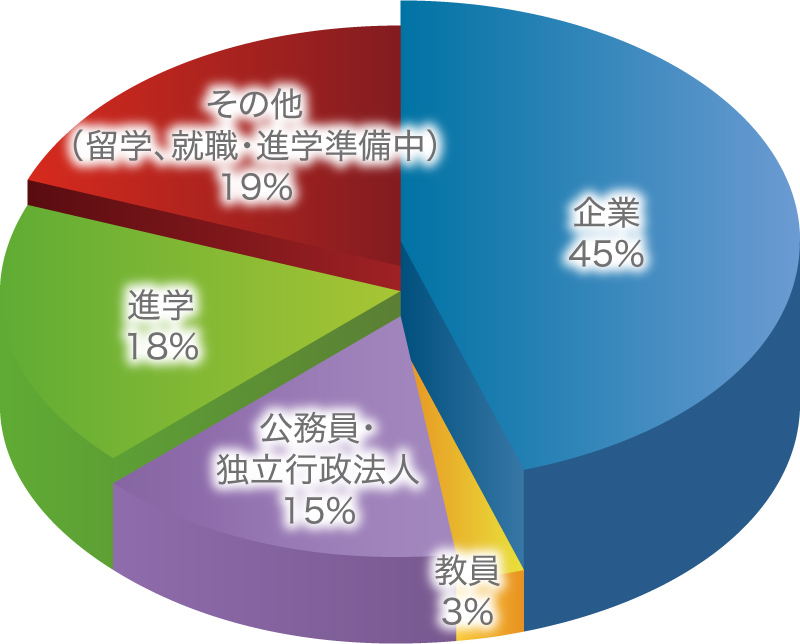進学と就職
卒業後の人文学類生の主な進路としては、大学院進学と就職が挙げられ、伝統的に進学の比率が比較的高くなっています。
進学先の大学院としては、研究者や高度職業人を目指す筑波大学人文社会科学研究群人文学学位プログラムが大半ですが、専門性の高い中学校・高等学校教員を養成する筑波大学教育研究科や、他大学の大学院に進学する卒業生もいます。
就職については、数の順で一般企業、公務員・独立行政法人職員、中学校・高等学校教員となっており、それぞれに合わせた就職支援を行っています。
人文学類におけるキャリア支援
- キャリア支援全般
- 1年生は入学した春学期にファーストイヤーセミナーが必修となっており、クラスごとに担任教員がついて大学生活への導入を図ります。ここではキャリア形成への導入も重視しており、4回程度を合同ファーストイヤーセミナーと位置づけ学外から講師を招くなどして早期からキャリア形成への意識を高めています。
また、全学では「キャリアデザイン」の科目が学年別に開講され、多くの人文学類生が履修します。これらの科目では、受講者間でのディスカッションやプレゼンテーションが重視されます。
ほか、筑波大学では「つくばキャリアポートフォリオ(愛称CARIO)」というツールをキャリア形成支援の中核としています。これは50種類以上のシートにより大学生活を記録し、就職や進学までスムーズにつなげようとするものです。 - 一般企業就職への支援
- 人文学類独自に学生のための就職支援企画を行っています。外部講師による就職セミナーを複数回、また内定を得た4年生による「人文学類生のための就活最新情報取得会」を開催しています。学類での説明会のほか、数百社が参加する全学での学内企業説明会も行われ、有名企業に就職した多数のOB・OGから学内で直接話を聞き、他大学の学生より有利な就職活動を行うことができます。
- 公務員・独立行政法人職員試験への支援
- こちらも、人文学類就職支援企画としてOB・OGによるセミナーや内定を得た4年生による報告会を開催しています。全学でもセミナーや格安で受講できる対策講座が準備されています。また、上記の学内企業説明会には一般企業だけでなく官公庁や独立行政法人からも参加があり、多様な話やアドバイスを聞くことができます。
- 中学校・高等学校教員採用試験への支援
- 本学ならびに人文学類が伝統的に強みを持つ進路です。OB・OGを招いたセミナーを学類で開催しているほか、全学でも教育界で活躍する本学関係者を招いた説明会などが行われます。
進路状況

令和4年度卒業生の進路
主な進路先(法人格等は一部省略、令和2~4年度)
| 企業 |
|
|---|---|
| 教員 | 公立小学校(群馬)、公立高等学校(青森、秋田、茨城、群馬、高知、栃木、長野)、つくば秀英高等学校、常磐大学高等学校 |
| 公務員等 | 医薬品医療機器総合機構、厚生労働省、国土交通省、国土地理院、国立印刷局、市役所(牛久、宇都宮、柏、川崎、越谷、坂井、札幌、草加、流山、名古屋、横浜)、森林総合研究所、鉄道建設・運輸施設整備支援機構、東京国税局、東京都江戸川区役所、都道府県庁(愛知、茨城、大阪、埼玉、千葉、東京、長野、福島、山形)、農業・食品産業技術総合研究機構、農林水産省、物質・材料研究機構、門司税関、文部科学省、陸上自衛隊 |
| 進学 | 大阪大学大学院人間科学研究科、岡山大学教育学研究科教職実践専攻、京都大学アジア・アフリカ地域研究科、筑波大学人間総合科学学術院、筑波大学人文社会ビジネス科学学術院、筑波大学理工情報生命学術院、東京大学大学院教育学研究科、東京大学大学院情報学環、東北大学公共政策大学院、北海道大学文学院人文学専攻 |
Higher Education and Employment
The main paths for students graduating from the College of Humanities are graduate school and employment, and traditionally the percentage of students who go on to graduate school is relatively high.
Careers Support at the College of Humanities
- General Career Support
- First year students must take the Freshman Seminar in spring semester, where each class has a homeroom teacher who helps introduce them to life at the university. Here, there is a focus on providing career guidance, and there are roughly four joint Freshman Seminars in which lecturers from outside the university are invited to help raise awareness on career development early on in the student’s time at the university.
The University of Tsukuba also uses a tool calledthe Tsukuba Career Portfolio (nicknamed CARIO), which serves as the core of our career development support. This systems records life at the university using 50 different kinds of sheets, helping students smoothly transition to higher education and employment. - Support for Employment at Companies
- The College of Humanities has its own job placement support program for students. We host multiple employment seminars held by lecturers from outside the university as well as a “Latest Job Hunt Information Session for Humanities Students” hosted by fourth year students who have received job offers. In addition to information sessions at each college, company information sessions joined by hundreds of companies are held on campus throughout the university, letting students ask questions directly to alumni who have found work at famous companies and giving them an advantage over students at other universities in their job hunt.
- Test Support for Civil Servant & Staff at Independent Administrative Agencies
- Seminars by alumni and information sessions by fourth year students who have received job offers are hosted as part of the College of Humanities job placement support program. The entire university also hosts seminars and examination prep courses that can be taken at a low cost. Also, students can get advice and listen to a variety of talks in the on-campus information sessions mentioned earlier, which are joined not only by companies but government agencies and independent administrative agencies.
- Support for Junior/Senior High School Teacher Examinations
- This career path has traditionally been a forte at our university and the College of Humanities. We not only host seminars by alumni at the college, but also have information sessions joined by people affiliated with the university working in the world of educaation.
Career Path Facts

Career Paths for Students Graduating March 2018
Major Career Paths (corporate statuses omitted, 2014-2018)
| Companies |
|
|---|---|
| Teaching Faculty | Ibaraki Prefectural High School, Saitama Prefectural High School, Shiga Prefectural High School, Shizuoka Prefectural High School, Nagano Prefectural High School, Mie Prefectural High School, Ibaraki Prefectural Junior High School, Gifu Prefectural Junior High School, Nagano Prefectural Junior High School, Tsuchiura Nihon University Secondary School |
| Civil Servant | Ministry of Health, Labour and Welfare; Ministry of Land, Infrastructure, Transport and Tourism; Ministry of Finance; Ministry of Internal Affairs and Communications; Ministry of Education, Culture, Sports, Science and Technology; Aichi Prefectural Government; Ibaraki Prefectural Government; Okinawa Prefectural Government; Saitama Prefectural Government; Chiba Prefectural Government; Tokyo Metropolitan Government; Hokkaido Prefectural Government; Yamanashi Prefectural Government; Itabashi Ward Office, Tokyo; Koto Ward Office, Tokyo; Shibuya Ward Office, Tokyo; Taito Ward Office, Tokyo; Tsukuba City Hall; Mito City Hall; University of Tsukuba (staff); University of Tokyo (staff) |
| Higher Education | Graduate School of Human and Environmental Studies, Kyoto University; Graduate School of Business Sciences, Humanities, and Social Sciences, University of Tsukuba; Master’s Program in Education, University of Tsukuba; Graduate School of Comprehensive Human Sciences, University of Tsukuba; The Graduate School of Life and Environmental Science, University of Tsukuba; Graduate School of Education, University of Tokyo; Graduate School for Law and Politics, University of Tokyo; Graduate School of Social Sciences, Hitotsubashi University; Graduate School of the University of London (Development Studies) |